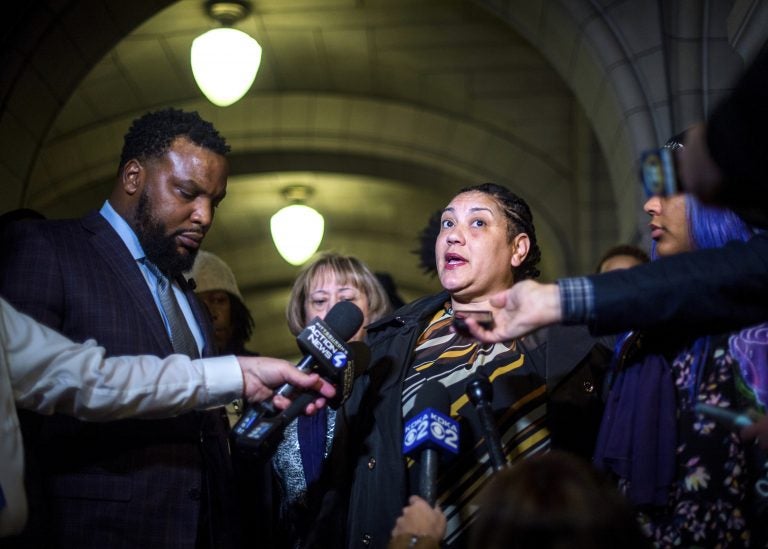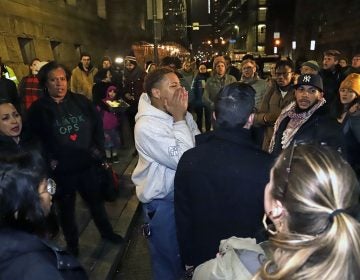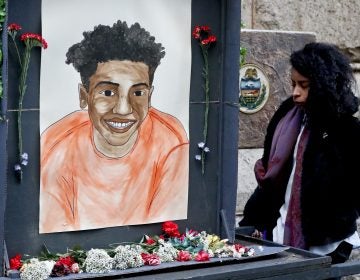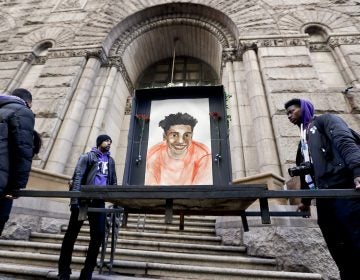Jury gets case in trial of cop who killed Antwon Rose
Former East Pittsburgh Police Officer Michael Rosfeld fired on 17-year-old Antwon Rose II last summer outside Pittsburgh in a killing that sparked weeks of unrest.

Rose family attorney, S. Lee Merritt, (left), and Michelle Kenney, (center), mother of Antwon Rose II, address members of the media following the closing arguments in the homicide trial of former East Pittsburgh Police officer Michael Rosfeld, Friday, March 22, 2019, at the Allegheny County Courthouse in Pittsburgh. (Nate Smallwood/Pittsburgh Tribune-Review via AP, Pool)
A jury began deliberating Friday over whether a white former police officer was “judge, jury and executioner” when he shot an unarmed black teenager in the back, as prosecutors claimed, or was justified in using lethal force to stop a fleeing suspect whom he said he perceived as a threat.
Former East Pittsburgh Police Officer Michael Rosfeld fired on 17-year-old Antwon Rose II last summer outside Pittsburgh in a killing that sparked weeks of unrest.
Rosfeld, 30, shot Rose in the back, arm and side of the face after pulling over an unlicensed taxi that had been used in a drive-by shooting. Rosfeld ordered the driver to the ground, but Rose and another passenger got out and began running away.
Jurors saw video of the fatal confrontation, which showed Rose falling to the ground after being hit.
Assistant District Attorney Jonathan Fodi declared in his closing argument Friday that Rosfeld had acted as “judge, jury and executioner.”
Rosfeld could have waited for backup or given chase, Fodi said, adding that teenagers sometimes run from police. “Is it foolish? Yes. Does it deserve death? No. Is it reasonable? Absolutely not,” Fodi said. “There was no need to use deadly force.”
Rosfeld told the jury he thought Rose or the other passenger had a gun. The defense said the shooting was justified because Rosfeld believed he was in danger and couldn’t wait for other officers to get there.
“He’s a sitting duck,” defense attorney Patrick Thomassey told jurors in his closing, asking them to consider “the standard of what a reasonable police officer would do under the circumstances.”
Prosecutors charged Rosfeld with an open count of homicide, meaning the jury can convict him of murder or manslaughter.
The defense asked Judge Alexander Bicket to acquit Rosfeld of all charges, but the judge declined.
“We believe the jury has enough information to arrive at the right conclusion: that Antwon Rose was murdered,” the family’s attorney, S. Lee Merritt, told The Associated Press in a courthouse hallway. Merritt said “it’s pretty obvious” Rose was not a threat to Rosfeld.
Rose had been riding in the front seat of the cab when another occupant in the back, Zaijuan Hester, rolled down a window and shot at two men on the street, hitting one in the abdomen. A few minutes later, Rosfeld spotted their car, which had its rear windshield shot out, and pulled it over.
Hester, 18, pleaded guilty last week to aggravated assault and firearms violations. Hester told a judge that he, not Rose, did the shooting.
At the beginning of the trial’s fourth day Friday, a defense expert, retired Pennsylvania State Police Trooper Clifford W. Jobe Jr., returned to the stand and repeated his belief that Rosfeld followed his training when he shot Rose.
Under cross-examination, Jobe agreed with Fodi that a police officer can lie, violate the law or be unreasonable. He also agreed with the prosecutor that, in some circumstances, it is reasonable to refrain from shooting or to disengage from a situation.
But Jobe said that Rosfeld was within his rights to use “deadly force” to stop fleeing suspects he thought had been involved in a shooting.
“What did Michael Rosfeld do wrong on June the 19th?” asked Thomassey, the defense attorney.
“I don’t think he did anything wrong. He was following his training,” Jobe replied.
A day earlier, Rosfeld testified that he thought Rose or the other passenger had pointed a weapon at him. Neither teen was holding a gun at the time, though two guns were later found in the car.
“It happened very quickly,” Rosfeld said. “My intent was to end the threat that was made against me.”
Prosecutors say Rosfeld has given inconsistent statements about the shooting, including whether he thought Rose was armed.
A prosecution witness has said that after the shooting, he heard Rosfeld say repeatedly, “I don’t know why I shot him. I don’t know why I fired.” Another prosecution witness said he heard the officer ask, “Why did he do that? Why did he take that out of his pocket?”
In his closing, Fodi said the video evidence shows “there was no threat” to Rosfeld, who he said “squared up” on the taxi “with plenty of time to do something about it.”
“We don’t shoot first and ask questions later,” Fodi said.
But Thomassey said prosecutors did not produce a single witness “to say Michael Rosfeld did not do what he was supposed to do. They knew he was doing it by the book.”
One juror, a white woman who had taken copious notes, was dismissed from the panel Friday and replaced with a white man. No reason was given for her dismissal. The jury now consists of seven men and five women. There are three black jurors.
Also Friday, Bicket lifted a gag order he imposed on the parties in the case. Thomassey made the request, saying that while he and prosecutors had abided by the judge’s order, the attorney for Rose’s family had not. Merritt released a letter to the media this week that Rose’s mother wrote to prosecutors urging them to show what a “kind, loving and funny” person her son was.
WHYY is your source for fact-based, in-depth journalism and information. As a nonprofit organization, we rely on financial support from readers like you. Please give today.




